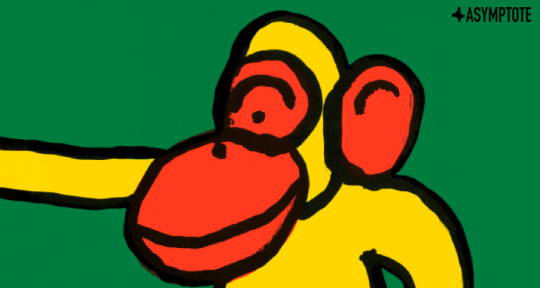It’s such a treat to welcome fellow journals of translation into the scene—and a rare one to welcome them back! We’re thrilled to announce that after a somewhat prolonged hiatus, acclaimed translators Ted Goossen and Motoyuki Shibata have put out the rebranded MONKEY: New Writing from Japan. The long-awaited edition features sundry gems from rising and established stars alike, and here to guide us through them is Assistant Managing Editor Lindsay Semel. Her interest in the project was piqued after covering prior MONKEY contributor Hiromi Kawakami’s People From My Neighbourhood (in Goossen’s own translation) for our August Book Club. Read on to learn why it paid off in spades!
After a nearly three-year hibernation, MONKEY: New Writing from Japan—formerly Monkey Business (2011–2017)—reemerged on the literary scene in full force this October. The annual journal aims to introduce anglophone readers to Japanese literature in its full depth and breadth. The mirror image of its eponymous predecessor, MONKEY is edited by two industry veterans who work in opposite directions: Ted Goossen, acclaimed translator from the Japanese, and his counterpart Motoyuki Shibata, one of the foremost translators of contemporary English literature into the same. Together, the two employ their formidable literary networks to facilitate the exchange of stories and ideas, challenge stereotypes, and offer promising new talent a foothold in a too-often impenetrable industry.
The high-profile likes of Haruki Murakami, Hiromi Itō, Hiromi Kawakami, and Mieko Kawakami, for example, appeared frequently in the pages of Monkey Business, and they all reappear in its new incarnation. Their participation lends both legitimacy and visibility to the journal, as well as prestige to their lesser-known colleagues. “Good Stories Originate in the Caves of Antiquity” is an interview between Murakami and Mieko Kawakami translated by Goossen. The last in a series of previously published conversations between the two, it enacts a sort of passing of the baton from the old to the new vanguard. Murakami insists equanimously that the “weight and strength [of ‘good stories’] have endured over great lengths of time—stretching back to those caves of antiquity”; meanwhile, Kawakami grills him on difficult topics like true evil and writers’ responsibility to speak to the suffering of their time. The result is simultaneously a philosophical treatise on the role of art in society, an insight into the thinking of two great public figures, a glimpse into the struggle between institutions and artists for the soul of the nation’s literature, and a gentle assertion that that soul need not submit to a single owner. READ MORE…

